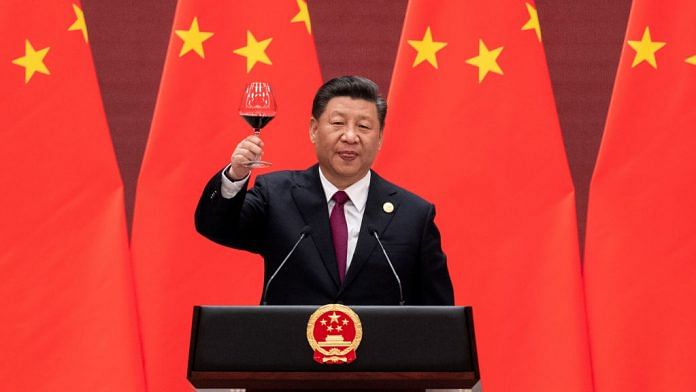New Delhi: China has adopted a ‘wolf-warrior’ mentality because an increasing sense of insecurity and defensiveness is causing it to become aggressive, ThePrint Editor-in-Chief Shekhar Gupta said in episode 485 of Cut The Clutter.
The term actually comes from a 2015 Chinese movie of the same name that was an instant blockbuster in the country. The movie’s plot was premised on soldiers going out and teaching the enemies of China a lesson — something you would expect to see in a Sunny Deol or an Akshay Kumar movie in Bollywood.
China has been creating trouble in Hong Kong, Taiwan, India and other neighbouring countries like Vietnam and Indonesia.
At a press conference in Beijing last Sunday, Chinese Foreign Minister Wang Yi had said that China’s new policy is to push back against “deliberate insults”.
“We never pick a fight or bully others. But we have principles and guts. We will push back against any deliberate insult, resolutely defend our national honour and dignity, and we will refute all groundless slander with facts,” he said.
The insults came from several countries, most significantly the US, and were on China delaying informing the world about Covid-19.
China has been at the receiving end of many questions: ‘Where did the virus come from? Was China transparent? Did China keep its obligations under international health laws?’
In fact, US president Donald Trump now has made this essential to his re-election campaign, and has even held China responsible for the Covid deaths in America.
All of this has pushed the Chinese on the defensive and led to the ‘wolf-warrior’ mentality.
Also read: China’s animosity record towards India reflects wolf warrior diplomacy: Taiwan representative
‘Wolf warrior’ diplomacy
Usually, Chinese diplomats tend to be very conventional and prosaic. They speak in long sentences that go round and round. Then you have to read between the lines to see what they mean, Gupta said.
However, of late, there’s been a change of style in Chinese diplomacy — in terms of the spoken word.
Chinese diplomat Lijian Zhao started this trend of ‘wolf-warrior’ diplomacy back in 2019 when he hit back at Susan Rice, former US president Barack Obama’s national security advisor, for her comments criticising the discrimination faced by Uyghurs in China.
An Uyghur himself, Zhao called out America’s ‘racial segregation’, and many of his tweets received flak for behaviour unbecoming of a diplomat.
Since then, Chinese ambassadors in various other countries, including the UK and France, have taken similar positions.
Also read: China says situation at border with India ‘stable and controllable’
China’s handling of the Covid-19 crisis
Despite being under attack from various countries, credit is due to China for handling the coronavirus situation in its own country quite well. Yet, for them to be so much on the defensive is startling.
There may, however, be certain reasons that explain this ‘wolf-warrior’ mentality being adopted by China at this point.
They could be adopting this diplomatic policy as a means of diverting attention from all the questions being asked from them. This could also be their way of saying that if you also raise questions, or join hands with the Americans to raise these questions, there will be consequences.
This may also just be a tactic adopted by Chinese President Xi Jinping to send a message to his internal constituency — ‘The whole world is against us, and I am fighting back’.
We must remember, nationalism is the glue that binds China. It is also the fuel that drives China.
Watch the latest episode of CTC here:




Comment by Rukiye Turdush needs to be responded by Shekhar Gupta else it would buttress the perception about the Print being a Chinese mouthpiece .
The Chinese diplomat Li Juan Zhao is not Uyghur. He is pure Chinese and enemy of Uyghurs like all other Chinese officials. This article should made correction on that ridiculous claim.
Li Joan zhao is not Uyghur. He is pure Chinese blood and enemy of Uyghurs like other Chinese officials. This news report should made correction for that part